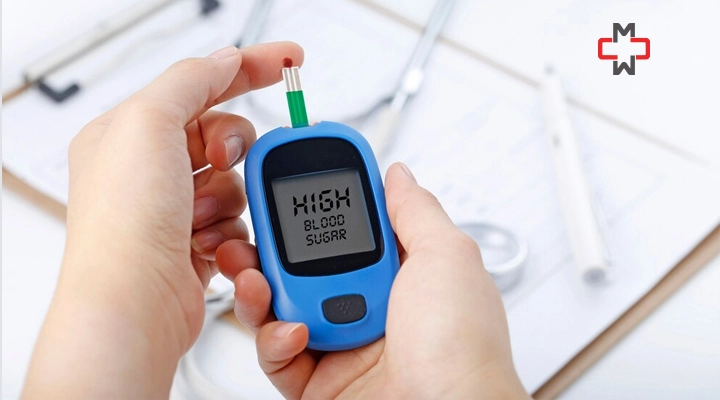Diabetes is a condition that affects millions all over the world, changing lives and requiring careful management. But among the various types of diabetes, which diabetes is worse, the one that stands out as the most challenging type?
Let’s understand the complexities of this condition and its types, as we unravel the question: “Which type of diabetes is worse?”
What is Diabetes?
Diabetes is a metabolic disorder that is characterized by elevated blood sugar levels, resulting from either insufficient insulin production or ineffective utilization of insulin by the body. Insulin, a hormone produced by the pancreas, regulates blood sugar levels and facilitates glucose absorption by cells for energy.
Types of Diabetes
Here are the two major types of diabetes listed below:
- Type 1 Diabetes: Often diagnosed in childhood or adolescence, type 1 diabetes occurs when the immune system mistakenly attacks and destroys insulin-producing beta cells in the pancreas. As a result, individuals with type 1 diabetes require lifelong insulin therapy to manage blood sugar levels.
- Type 2 Diabetes: The most common form of diabetes, type 2 diabetes typically develops in adults, although its prevalence among youth is rising. It occurs when the body becomes resistant to insulin or fails to produce enough insulin to meet its needs.
Which Type of Diabetes Is Worse?
While both types of diabetes pose significant health risks, type 1 diabetes is often considered much more serious considering its abrupt onset, reliance on exogenous insulin, and higher risk of diabetic ketoacidosis (DKA) without proper management.
However, type 2 diabetes presents its own challenges, such as progressive insulin resistance and potential complications if left untreated.
What Causes Type 1 and Type 2 Diabetes?
– Type 1 Diabetes:
- Autoimmune Response: Type 1 diabetes is primarily triggered by an autoimmune response, where the body’s immune system mistakenly attacks and destroys insulin-producing beta cells in the pancreas.
- Genetic Predisposition: Genetic factors play a significant role in predisposing individuals to type 1 diabetes.
- Environmental Triggers: While the exact cause is unknown, environmental factors such as viral infections or exposure to certain toxins may also contribute to the development of type 1 diabetes.
– Type 2 Diabetes:
- Insulin Resistance: Type 2 diabetes develops when the body becomes resistant to insulin or fails to produce enough insulin to regulate blood sugar levels effectively.
- Lifestyle Factors: Obesity, physical inactivity, and poor dietary habits are major contributors to insulin resistance and the development of type 2 diabetes.
- Genetic Factors: Family history and genetics play a significant role in increasing the risk of type 2 diabetes.
- Other Risk Factors: Aging and certain medical conditions such as polycystic ovary syndrome (PCOS) also increase the risk of developing type 2 diabetes.
What Are the General Symptoms of Diabetes?
Listed below are the most commonly occurring symptoms of diabetes – however, these symptoms may vary in severity and may not always be present in every individual with diabetes.
- Increased thirst: Experiencing persistent feelings of thirst.
- Frequent urination: Needing to urinate more often than usual, particularly at night.
- Unexplained weight loss: Losing weight without trying, despite increased appetite and food intake.
- Fatigue: Feeling unusually tired or lethargic, even after getting enough rest.
- Blurred vision: Experiencing blurry vision, which may be a sign of high blood sugar levels affecting the eyes.
- Slow wound healing: Cuts, bruises, or sores taking longer than normal to heal.
- Recurrent infections: Being more susceptible to infections, such as urinary tract infections or skin infections, due to compromised immune function.
When to See a Doctor?
It is important to seek medical attention if you experience any symptoms of diabetes or if you have risk factors for this condition.
Early diagnosis and treatment can help prevent or delay complications associated with diabetes, such as heart disease, stroke, kidney damage, and nerve damage.
Frequently Asked Questions
Which is worse, type 1 or type 2 diabetes?
Both the types of diabetes have their own challenges - however, the severity may vary depending on individual factors and complications.
Is type 1 or type 2 diabetes more common?
Type 2 diabetes is much more common, accounting for the majority of diabetes cases worldwide.
Is type 1 diabetes considered severe?
Yes, type 1 diabetes is generally considered more severe due to its abrupt onset, reliance on insulin therapy, and higher risk of diabetic ketoacidosis (DKA) without proper management.
– Disclaimer –
This blog is for informational & educational purposes only, and does not intend to substitute any professional medical advice or consultation. For any health related concerns, please consult with your physician, or call 911.
-
About The Author
Dr. Syra Hanif M.D.Board Certified Primary Care Physician
Dr. Syra Hanif is a board-certified Primary Care Physician (PCP) dedicated to providing compassionate, patient-centered healthcare.
Read More







